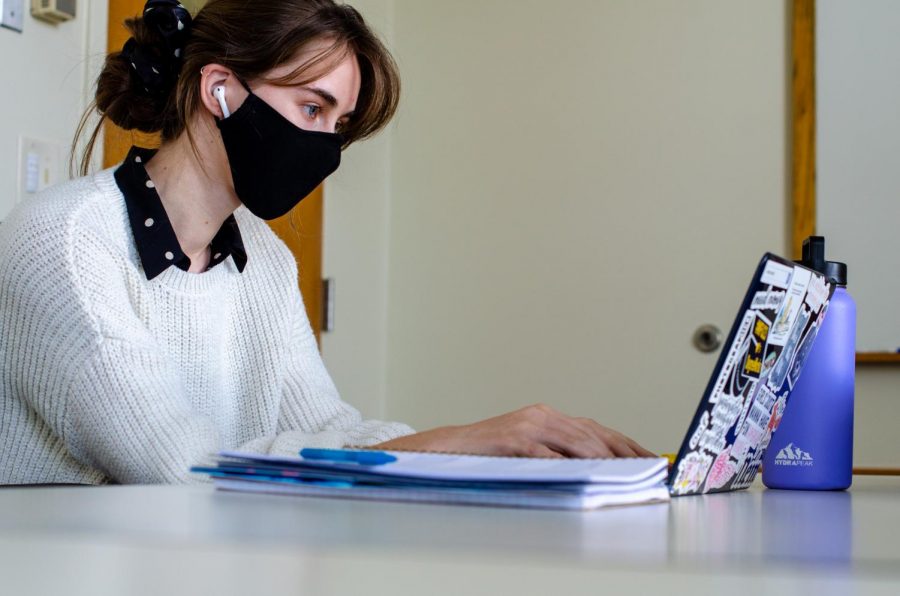Online learning forces onerous responsibilities on students
Benefits of digital learning platforms do not justify their detriment to work-life balance
September 30, 2021
The nickname “Work Forest” — intended to be a testament to the impressive rigor of Wake Forest academics — has gone too far. Our return to in-person classes has been an exhausting six weeks, and burnout doesn’t even begin to describe the emotion felt by students and faculty alike. The boundaries between academics and personal life are almost completely blurred, primarily thanks to the virtual nature of learning platforms like Canvas and Google Classroom.
Cornell University senior Jeremy Scheck posted a TikTok (@scheck) on Sept. 19 articulating his qualms with how these websites impose on student lives and “extend the school day indefinitely” to an invasive degree. The comments section was filled with the testimonies of frustrated students, such as those highlighting the double-standard of assignments being due at 11:59 p.m. to professors who list appropriate email hours ending at 5 p.m. on weekdays and reserving the weekend for their personal lives. They enjoy the privilege of setting their workday hours, and deadlines after 5 p.m., for example, send students the message that they’re expected to work beyond those reasonable hours.
When assignments are due at midnight, most students begin, complete and submit their work just before it’s due. Just last Sunday I had a discussion board post that I finished at around 10:30 p.m., leaving myself time to respond to two classmates before the deadline.
I was only the fourth student to post on Canvas, and the rest of my classmates’ responses trickled in between 10:30 p.m. and midnight. The beauty of virtual submission is that professors can see exactly what time students are finishing their assignments, which also means they know that the majority of students will complete their work at the last minute.
Nighttime and weekend due dates confine us to our study spaces outside of normal working hours at the will of professors who might not even look at those Canvas gradebooks for days or weeks.
Before the rise of online learning sites, especially pre-pandemic, students typically turned in assignments by hand at the beginning of each class period. For midterms and finals, this still might have meant staying up all night writing essays and sliding printed drafts under a professor’s office door in the middle of the night, but professors would never come in at midnight to distinguish between those who made it by 11:59 p.m. and those who would be deducted a letter grade for tardiness. Submitting assignments in person for weekend deadlines would have been outright disrespectful of professors’ personal time, so why doesn’t this intrusion translate to the virtual world?
Another one of Scheck’s commenters claimed, “We’re being groomed into tiny capitalists with no boundaries,” and I completely agree. We often view undergrad as four (ish) short years to tough out the stress of degree completion, intense socio-emotional development and all the other aspects that accompany college life. But that mindset obscures the reality that we enter the workforce with all of the hard-to-break habits we formed in this environment. Academic goals immediately transition to career goals and we have no opportunity to subvert our own expectations for work-life balance, thus perpetuating the lack of boundaries and producing pre-burnt out workers to join the ranks of our capitalist society.
I don’t want to set students at odds with professors because the toll of these websites takes its effect on us all in one way or another. Props to those who protect their peace with explicit working hours and other boundaries, but I know some professors who schedule-send their replies to my 1 a.m. emails, meaning they also work late into the night and have just as much (if not more) trouble finding balance and reclaiming their personal time. Professors then join us as victims of the expectations of “Work Forest”, and this world of virtual submissions disappoints everyone involved.
I’m not proposing we abolish Canvas, but I think we need to think critically about the effect it has on our Wake Forest community. No one is going to show up to Floatchella if our Wednesday evenings are committed to our courses because the class that meets once every Tuesday has reflections due the next day by midnight. Just because we can doesn’t mean we should, and we should not be conditioning students to devote every waking hour to refreshing emails on our phones and constantly thinking about work.
Virtual learning platforms enable institutions to cross our work-life boundaries until they’re obsolete, and we deserve rest.






















